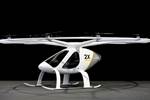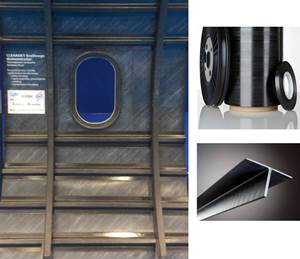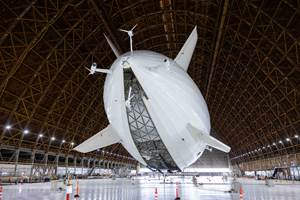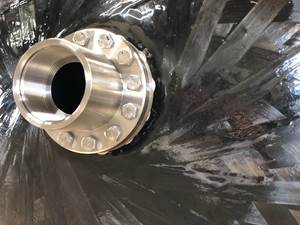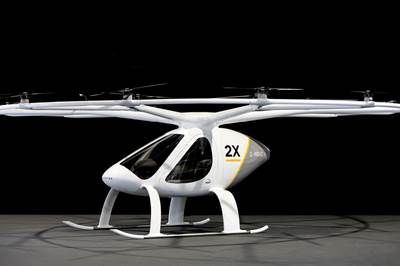Beta secures order for 20 composite eVTOL ALIA aircraft
Blade Urban Air Mobility operators to receive first passenger-configured Beta aircraft in 2024. Additional partners span medical, logistics, defense and passenger market segments.

Beta Technologies’ composites-intensive ALIA aircraft. Photo Credit: Beta Technologies
On April 13 Beta Technologies (South Burlington, Vt., U.S.) and Blade Urban Air Mobility (Blade, New York, N.Y., U.S.) announced a binding agreement through which Blade will secure up to 20 Beta electric vertical aircraft (EVA), becoming BETA’s first passenger service customer. This news comes on the heels of UPS’ announcement that it would buy up to 150 Beta EVA aircraft, plus charging stations, as part of that company’s long-term solution to reducing greenhouse gas emissions.
Founded in 2017, Beta and its team of aerospace engineers are building an electric powered ecosystem for aviation, the heart of which is ALIA, the electric vertical take-off and landing (eVTOL) aircraft that can carry up to six people or three standard cargo pallets, and of which is manufactured using composite materials and processes. Beta’s aircraft is said to emphasize simplicity, efficiency and sustainability, with customers found in logistics, medical, defense and, now, passenger aerospace markets.
“Blade is flying people in and out of cities every day, and we’re excited to partner together with the leader in UAM to create a new paradigm in passenger aviation,” says Kyle Clark, Beta’s founder and CEO. “Beta is a pragmatic company building pragmatic aircraft. It’s clear that the simplicity of our approach, strength of our technology, consistent progress against our timelines as well as the expertise of our team resonates with the best operators in the world. We are excited to partner with Blade and serve the passenger mission.”
According to Blade founder and CEO Rob Wiesenthal, Beta’s progress is formidable, with a scheduled delivery for ALIA slated to begin in 2024, which is ahead of Blade’s current projected deployment of EVA in 2025. Further, with this announcement, Blade says it has become Beta’s first passenger service partner. Additional customer validation for the eVTOL aircraft comes from United Therapeutics, Beta’s first customer and partner, which will rely on Beta’s aircraft to deliver organs for human transplantation, as well as the U.S. Air Force (USAF), which continues to participate in the Beta flight test campaigns as a part of its innovative USAF Agility Prime program.
Beta’s ALIA aircraft will have a 250 nautical mile range with a cruising speed of up to 170 miles per hour. Blade’s service with ALIA will begin on select routes using Blade’s existing private terminal infrastructure. These aircraft will be deployed for a diverse set of mission profiles to and from city centers across multiple geographies.
Further, the aircraft includes a novel combination of elements that create a smooth, quiet flying experience, with applications for moving both people and cargo, all while producing zero operational emissions. Charging will be completed in less than 50 minutes. While flying, Beta says the aircraft will be more than 10 times quieter than a helicopter, imperceptible over normal urban noise and quieter than cars on a highway.
ALIA’s zero emissions flight is also in line with the company’s sustainability goal to reach net zero emissions within the next 20 years. Beta hopes to also achieve this via a fully electric powered aviation charging network, which currently extends throughout the northeast United States, and has sites underway, with the plan to expand rapidly; these high-speed charging stations will enable aircraft to charge at airports, or land on an elevated deck and charge while crew and passengers access a lounge below, complete with work space and sleeping accommodations. Recharging takes less than an hour and can be accomplished in both on- and off-airport locations.
Beta says it also also developed immersive flight simulators, located in Burlington, Vt, Washington, D.C. and Springfield, Ohio, and a curriculum to train pilots on electric powered aircraft, to match an anticipated surge in demand.
Related Content
Welding is not bonding
Discussion of the issues in our understanding of thermoplastic composite welded structures and certification of the latest materials and welding technologies for future airframes.
Read MorePEEK vs. PEKK vs. PAEK and continuous compression molding
Suppliers of thermoplastics and carbon fiber chime in regarding PEEK vs. PEKK, and now PAEK, as well as in-situ consolidation — the supply chain for thermoplastic tape composites continues to evolve.
Read MoreNext-generation airship design enabled by modern composites
LTA Research’s proof-of-concept Pathfinder 1 modernizes a fully rigid airship design with a largely carbon fiber composite frame. R&D has already begun on higher volume, more automated manufacturing for the future.
Read MoreInfinite Composites: Type V tanks for space, hydrogen, automotive and more
After a decade of proving its linerless, weight-saving composite tanks with NASA and more than 30 aerospace companies, this CryoSphere pioneer is scaling for growth in commercial space and sustainable transportation on Earth.
Read MoreRead Next
Volocopter introduces Volocopter 2X eVTOL aircraft at Auto Shanghai 2021
Volocopter and Geely Technology reveal aircraft model, highlighting a cooperation to bring urban air mobility services to the Chinese market.
Read MoreDeveloping bonded composite repair for ships, offshore units
Bureau Veritas and industry partners issue guidelines and pave the way for certification via StrengthBond Offshore project.
Read MoreVIDEO: High-volume processing for fiberglass components
Cannon Ergos, a company specializing in high-ton presses and equipment for composites fabrication and plastics processing, displayed automotive and industrial components at CAMX 2024.
Read More

